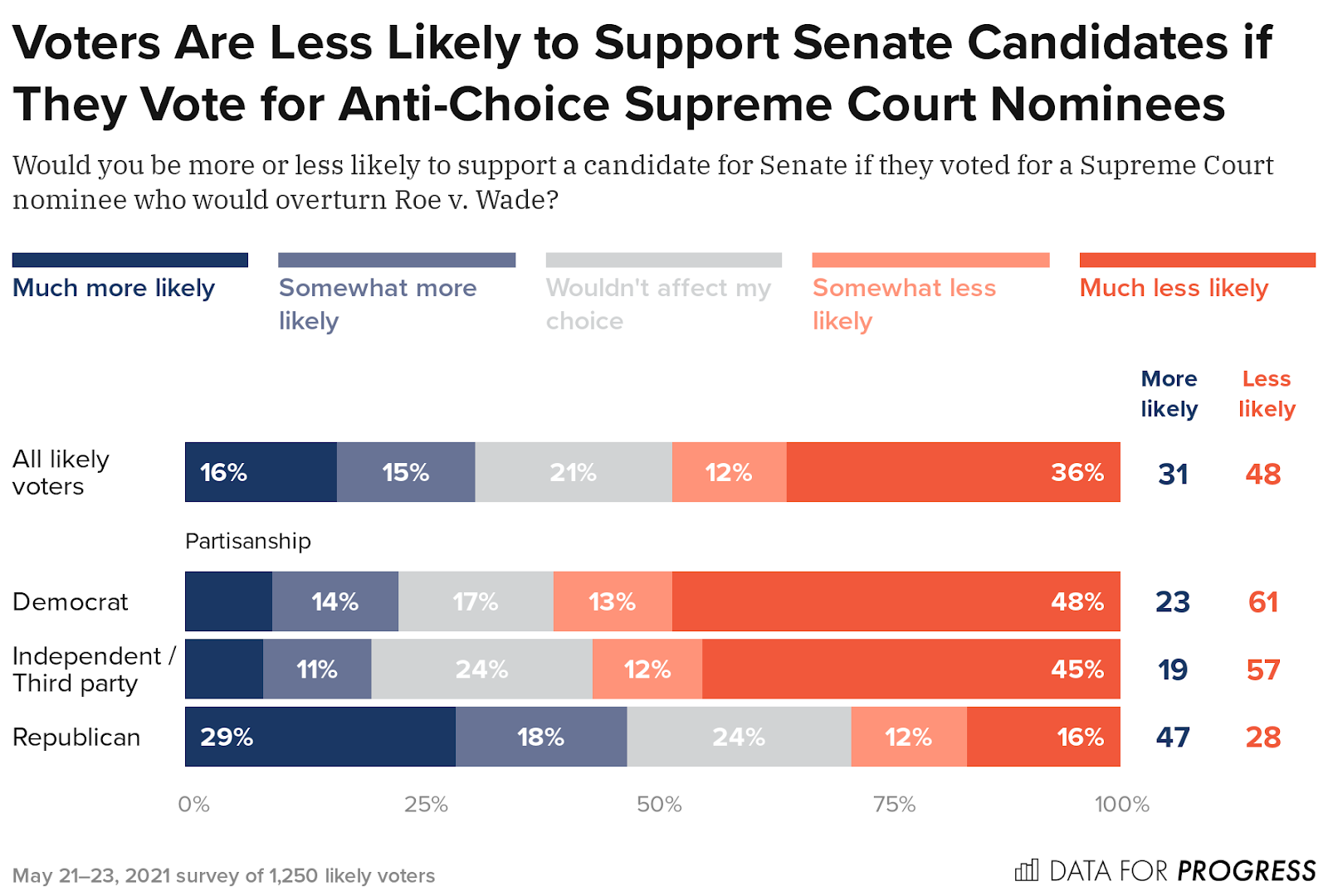Voters Agree That the Supreme Court Should Uphold Roe v. Wade
By Devi Ruia
In May, the Supreme Court announced that they would hear a case concerning a Mississippi law that would seek to ban most abortions 15 weeks into pregnancy. This new case would give the court the opportunity to strike or pare down the constitutional right to an abortion that was established through Roe v. Wade in 1973, which ruled that banning abortion in the first two trimesters of pregnancy was unconstitutional.
Now that the Supreme Court has an overwhelming majority of conservative justices on the bench — 6 justices — this case is seen as a pivotal moment in abortion rights. Regardless of how the court rules in this case, agreeing to hear arguments on it shows that the court is willing to revisit Roe v. Wade and Planned Parenthood v. Casey, thereby not necessarily viewing the decisions as settled precedent.
The court will hear arguments on this case in their next term, meaning a decision is likely to be reached in the summer of 2022, mere months before the 2022 midterm elections. This is especially important as new Data for Progress polling shows that voters are not in favor of the Supreme Court overturning Roe v. Wade.
In a national survey of likely voters, Data for Progress gauged voters’ opinions on state efforts to restrict abortion access, the Supreme Court overturning Roe v. Wade, and their support for Senate candidates who voted to confirm Supreme Court justices who would overturn Roe v. Wade.
Voters oppose state government efforts to restrict abortion access.
Data for Progress polling found that voters nationwide disagree with state governments’ efforts to restrict abortion access by a 34-point margin. This includes Democrats by a 64-point margin, Independents by a 46-point margin, and more than two-fifths of Republicans.
Voters believe that the Supreme Court should not overturn Roe v. Wade
Next, we asked voters whether or not they believed that the Supreme Court should overturn Roe v. Wade. Likely voters believed that the Supreme Court should not overturn Roe v. Wade by a 25-point margin. This included Democrats by a margin of 53-points, Independents by a margin of 44-points, and more than one-third of Republicans.
Voters are less likely to vote for Senate candidates that voted to confirm SCOTUS nominees that would overturn Roe v. Wade.
We also asked voters if they would be more or less likely to support a Senate candidate that had voted to confirm a Supreme Court justice that would overturn Roe v. Wade. By a 17-point margin, national voters said that they would be less likely to support such a candidate. This includes Democrats by a 38-point margin and Independents by a 38-point margin. A plurality of Republicans said they would be more likely to support such a candidate.
Conclusion
We find that voters are overwhelmingly opposed to state governments’ attempts to restrict abortion access. They are strongly against the Supreme Court overturning Roe v. Wade, instead wanting abortion to remain legal nationwide. While the Supreme Court is supposedly an apolitical body, overturning Roe v. Wade and the precedent set by the court in that case would be an unprecedented and nakedly partisan move. This is especially true considering that three of the conservative justices on the court were appointed by President Trump, who vowed to appoint justices to overturn Roe v. Wade. If the court makes this move, they will be going against public opinion and precedent, and as our polling shows, the Senate candidates that voted to confirm any justices that vote to overturn Roe v. Wade will likely face the consequences at the ballot box, as they should.
Devi Ruia (@DeviRuia) is a press assistant at Data for Progress.
Methodology
From May 21 to 23, 2021, Data for Progress conducted a survey of 1,250 likely voters nationally using web panel respondents. The sample was weighted to be representative of likely voters by age, gender, education, race, and voting history. The survey was conducted in English. The margin of error is ±3 percentage points. N=1250 unless otherwise specified. Some values may not add up to 100 due to rounding.



